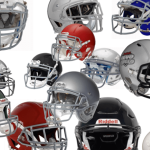By Thomas J. Ryan
Total Hockey filed for Chapter 11 bankruptcy petition and is looking for a buyer.
The 32-store chain had assets of $10 million to $50 million and liabilities in the range of $50 million and $100 million, according to the filing in U.S. Bankruptcy Court in St. Louis. The filing was blamed on one of the warmest winters on record in 2015, the weakening Canadian dollar, the collapse of a key vendor and a difficult integration of the Players Bench acquisition last year.
“The Chapter 11 filing was necessary as a result of a loss of liquidity over the past six to nine months,” said Total Hockey CEO and Owner Michael Benoit in a statement.
According to court papers, Total Hockey has entered into an asset purchase agreement with TSG Enterprises LLC, which has more than 40 specialty goods operating under the Pure Hockey and Hockey Giant names. The purchase price was set at $22.5 million. TSG will serve as the stalking horse bidder to set the floor to an upcoming bankruptcy auction. Total Hockey also has three distribution centers.
Benoit said in the statement, “The company has worked with TSG over the last several weeks to ensure the best outcome for all of its creditors, customers, employees, and suppliers. Total Hockey is asking for the court to approve a sale process that would culminate in an auction the last week of July.”
Total Hockey, based in Maryland Heights, MO, was founded in 1999 by Benoit as a spinoff from a general sporting goods company, and expanded from the St. Louis area to Chicago, Minneapolis, Detroit, Philadelphia, Washington, D.C. and other major NHL markets. The privately held chain also moved into lacrosse and apparel in 2012, opening several stores under the brand Total Lacrosse. Last year, it acquired Players Bench, a Denver-based hockey and lacrosse retailer with eight stores in Colorado, Ohio, Texas, Utah and Wisconsin, adding $12 million in annual revenue.
Total Hockey also invested in its e-commerce business, which includes totalhockey.com, goalie.totalhockey.com, and lacrosse.totalhockey.com. In 2015, $17 million, or 27 percent of Total Hockey’s $63 million in revenue, came from online sales. In 2014, revenues were $60 million.
According to court documents, Total Hockey experienced significant growth over the last decade, ranking among Inc. Magazine’s fastest growing privately-held companies for eight consecutive years. Moreover, comparable store sales were positive every quarter until 2015.
However, business softened dramatically last year, especially during the last half of the year due to four factors.
- First, Easton Hockey, the industry’s third largest vendor at the time, “completely collapsed,” and was ultimately sold “as a distressed company” to Performance Sports Group in January 2016. Total Hockey wrote in court papers, “This collapse left a surfeit of obsolete inventory in the market.”
- Second, the Canadian dollar fell against the U.S. dollar by 23 percent over the course of 2015, with most of the decline coming in the second half of the year. As a result, many of Total Hockey’s retail locations that are host cities for youth tournaments (e.g., Chicago, Detroit, and Philadelphia) saw fewer Canadian teams enter events and those attending spent far less because of adverse exchange rates.
- Third, sales were hurt by what NOAA recorded as the second warmest year on record for the continental U.S. in 2015. Total Hockey wrote, “As a result of this, categories that are traditionally a meaningful segment of our business because of outdoor skating (especially in Minnesota and Michigan) were off dramatically.”
- And finally, the Players Bench acquisition closed two months later than anticipated on July 31, 2015, “causing many integration issues to extend well into the core of the hockey selling season.”
As a result, comparable store sales were off over 8 percent for the fourth quarter of 2015 and EBITDA for the year “was a sizable negative.” In the current year, same-store sales are off approximately 5 percent and margins on Total Hockey’s sales declined from 33 to 28 percent. Total Hockey added, “Finally, because of the debtors retail for predominately winter sports, May through July is typically the most difficult business period.”
Last year, Total Hockey secured $35 million in financing to fund the Players Bench acquisition, to refinance debt and fund store expansion. Outstanding principal and interest for the loans exceeded $16 million, and a forbearance agreement on one of the loans terminated July 5 making payment immediately due.
Total Hockey said in court papers that its board on June 6 hired Lee Diercks, a partner at turnaround firm Clear Thinking Group LLC, as its chief restructuring officer. Diercks said in court papers that in order to facilitate a turnaround, corporate full-time staff had been reduced by 20, with a temporary reduction in management compensation. Marketing spend was also shifted away from television and print advertising toward digital while contracts with UPS and other vendors had been renegotiated. A comprehensive store and distribution center labor model had also been implemented.
While the changes will collectively reduce costs by approximately $2.5 million, Total Hockey has “yet to enjoy the yield from all of these changes” due to the seasonality of the business. The retailer added, “The forces that led to 2015’s incredibly weak fourth quarter have begun to attenuate, but are still present.”
In recent weeks, Total Hockey had been in talks with competitors and private equity firms about acquiring the chain but no deal was reached. Total Hockey’s board voted for filing for bankruptcy on June 30.
While reaching a deal with TSG Enterprises to provide a stalking horse bid, Total Hockey starting on June 23 commenced a supplemental marketing effort to generate potential bidders to the bankruptcy auction about purchasing the chain on a going concern basis. A total of 53 private equity firms and 11 strategic competitors have been identified and communication efforts with such parties are continuing.
Underscoring the urgency around a quick sale, Total Hockey said it doesn’t have sufficient funds to purchase needed inventory and to fully stock their stores. Dropping inventory levels have negatively impacted the retailer’s cash flows, “which make a lengthy post-petition sale process untenable.” Eroding inventory levels will also impact any purchase price in the auction.
The filing also noted that TSG Enterprises has insisted on a closing date of August 5 for the sale to fully stock the stores in time for the start of the prime hockey selling season, which starts in late August/early September. Total Hockey noted that there is up to a 30-day lag in ordering and then receiving product.
Total Hockey estimates there is approximately $34 million of unsecured debt as of the petition date. The unsecured debt comprises monies owed to trade vendors and suppliers, landlords, tax authorities, customers and employees.
Its largest unsecured vendor trader creditors are Bauer Hockey, with an unsecured claim of $13.8 million, Reebok-CCM Hockey, $7.3 million; Warrior, $1.48 million; Easton, $1.28 million; Sherwood Hockey, $448,249; STX Lacrosse, $349,537; and Vaughn Custom Sports, $295,625. Other vendors on the list of the Top 20 unsecured creditors include True Temper Sports, $291,025; Maverik Lacrosse, $288,832; North American Tape, $286,994; Brine, $283,842; Nike USA, $269,906; Peony Apparel, $211,924; Brians Custom Sports, $193,184 and Shock Doctor, $180,918.
Bauer Hockey, Easton, Maverik Lacrosse and Brine are all owned by Performance Sports Group.
Michael and Katherine Benoit each own 50 percent of Total Hockey’s parent, Hipcheck LLC, according to court filings.
Photo courtesy Total Hockey
















